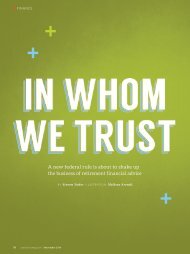Finance
You also want an ePaper? Increase the reach of your titles
YUMPU automatically turns print PDFs into web optimized ePapers that Google loves.
• FINANCE<br />
For a sense of how fungible the label “financial<br />
adviser” has become, talk to Mike Chamberlain<br />
of Chamberlain Financial Planning & Wealth<br />
Management, which has an office in Sacramento.<br />
“'Financial services industry' is a very broad<br />
term,” he says, “and I don’t like being included in it.<br />
It’s embarrassing — if I tell someone I’m a financial<br />
adviser they immediately start to duck, thinking that<br />
I’m trying to sell them something.”<br />
Consider the alphabet soup of titles that adorn those<br />
counseling people on their financial futures. They include Accredited<br />
Financial Counselor (AFC), Accredited Investment<br />
Fiduciary (AIF), Asset Protection Planner (APP) and Accredited<br />
Asset Management Specialist (AAMS). Those are just the<br />
A’s — the Financial Industry Regulatory Authority counts 167<br />
such acronyms in all.<br />
And a title doesn’t necessarily connote expertise. Some<br />
designations have real teeth. Among other requirements, a<br />
Certified Financial Planner (CFP) has to have advanced education<br />
in finance (like a Ph.D. in business or economics) and do 30<br />
hours of continuing education every two years. Others, like Behavioral<br />
Financial adviser (BFA), just need to take two 2-month<br />
courses from a particular for-profit college and pass an exam.<br />
Soon all planners who give retirement investment advice<br />
will have to adopt an additional designation, one that won’t<br />
appear behind their name: fiduciary. That means they’ll be legally<br />
bound to act in their clients’ best interest, not their own.<br />
A U.S. Department of Labor rule set to kick in next April will<br />
require retirement advisers to meet the fiduciary standard.<br />
Chamberlain already operates as an accredited investment<br />
fiduciary — his fees don’t waver depending on which<br />
investment he recommends. That’s not true of many in the<br />
industry, who earn commissions based on selling specific<br />
products, some of them high-cost.<br />
For fee-only advisers like Chamberlain, the effects will be<br />
few. For other local financial planners who work on retirement<br />
accounts, the change may well mean retooling how they make<br />
money, and some may not survive. The rule applies only to retirement<br />
accounts because only these accounts, such as 401(k)s and<br />
IRAs, are under the DOL’s purview. The agency doesn’t regulate<br />
regular investment accounts. Those are the province of the U.S.<br />
Securities and Exchange Commission, which so far hasn’t required<br />
all who give financial advice to operate as fiduciaries.<br />
$17 BILLION IN HIDDEN FEES<br />
Financial advisers get compensated in a range of ways, but<br />
the two big ones are fee-only and commission. Typically,<br />
those who earn fees charge a flat retainer that doesn’t change<br />
with the advice they give, a fee that’s a percentage of their<br />
client’s assets under management or an hourly rate. Those<br />
"If I tell someone I’m a financial<br />
adviser, they immediately start<br />
to duck, thinking that I’m trying<br />
to sell them something.”<br />
— Mike Chamberlain, certified financial<br />
planner and accredited investment fiduciary,<br />
Chamberlain Financial Planning & Wealth Management<br />
Forget financial anxiety<br />
with our<br />
pinpoint expertise,<br />
experience-driven insights<br />
and lightning-fast<br />
responsiveness.<br />
who earn commissions typically make<br />
money when they sell the customer a<br />
specific product. Those who advise<br />
retail investors say that generally,<br />
the interests of fee-only advisers are<br />
more likely to align with those of their<br />
clients because they don’t have the<br />
conflicts of interest that advisers on<br />
commission do.<br />
Conflicted financial advice costs<br />
retirement savers millions each year.<br />
A 2015 White House Council of Economic<br />
Advisers analysis estimates<br />
that hidden fees and commissions<br />
drain away about 1 percentage point<br />
of their investments annually. That<br />
doesn’t sound like much. But if true,<br />
because of the power of compounding,<br />
an investor’s nest egg expands 25 percent<br />
less than it otherwise would over<br />
the course of 35 years. That means a<br />
$10,000 investment would grow to just<br />
$27,500 instead of $38,000 over that<br />
time frame, according to the council.<br />
All told, such losses cost U.S. savers<br />
$17 billion a year, the study concludes.<br />
“The fees and disclosures have<br />
been awful in the IRA marketplace,”<br />
says Mike Genovese, partner at<br />
Genovese Burford & Brothers in Sacramento.<br />
“It’s been a tough go for the<br />
consumer in this country, because so<br />
many [advisers] are incentivized to get<br />
[clients] to roll over their money and<br />
pay exorbitant fees,” he says.<br />
The new regulation applies to any<br />
advice on tax-advantaged retirement<br />
plans given by independent securities<br />
broker-dealers, insurance brokers, financial<br />
planners and other financial pros. It<br />
doesn’t ban commissions, but advisers<br />
have to be able to show that they didn’t<br />
benefit by recommending one product<br />
over another. Advisers who still want to<br />
earn commissions will have to present<br />
their clients with a contract stipulating<br />
that, among other things, the adviser will<br />
act in the client’s best interest, receive<br />
only reasonable compensation and disclose<br />
how he or she gets paid.<br />
But there’s one feature that makes<br />
the best-interest contract important: It<br />
Business • Construction<br />
Education • Public Sector<br />
Individuals g<br />
and Trust Services<br />
Nonprofits and Associations<br />
Insurance Risk Pools<br />
Employee Benefit Plans<br />
916.646.6464<br />
GilbertCPA.com<br />
Offices in Sacramento and Folsom<br />
72 comstocksmag.com | November 2016<br />
November 2016 | comstocksmag.com 73





